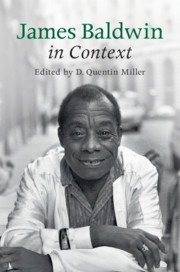Book contents
- James Baldwin in Context
- James Baldwin in Context
- Copyright page
- Contents
- Contributors
- Introduction: James Baldwin in Context
- Part 1 Life and Afterlife
- Chapter 1 Harlem During and After the Renaissance
- Chapter 2 American Writers in Paris
- Chapter 3 Greenwich Village and Emerging Bohemianism
- Chapter 4 1963: Baldwin’s Annus Mirabilis
- Chapter 5 East Meets West: Baldwin in Istanbul in the 1960s
- Chapter 6 Baldwin as Teacher
- Chapter 7 A Long Way from Home: Baldwin in Provence
- Chapter 8 Decline of Reputation in the 1980s
- Chapter 9 The Critical Renaissance: 1999–Present
- Chapter 10 Biographies
- Chapter 11 The Matter of Black Lives: Baldwin Today
- Part 2 Social and Cultural Contexts
- Part 3 Literary Contexts
- Index
Chapter 6 - Baldwin as Teacher
from Part 1 - Life and Afterlife
Published online by Cambridge University Press: 12 July 2019
- James Baldwin in Context
- James Baldwin in Context
- Copyright page
- Contents
- Contributors
- Introduction: James Baldwin in Context
- Part 1 Life and Afterlife
- Chapter 1 Harlem During and After the Renaissance
- Chapter 2 American Writers in Paris
- Chapter 3 Greenwich Village and Emerging Bohemianism
- Chapter 4 1963: Baldwin’s Annus Mirabilis
- Chapter 5 East Meets West: Baldwin in Istanbul in the 1960s
- Chapter 6 Baldwin as Teacher
- Chapter 7 A Long Way from Home: Baldwin in Provence
- Chapter 8 Decline of Reputation in the 1980s
- Chapter 9 The Critical Renaissance: 1999–Present
- Chapter 10 Biographies
- Chapter 11 The Matter of Black Lives: Baldwin Today
- Part 2 Social and Cultural Contexts
- Part 3 Literary Contexts
- Index
Summary
In a 1963 “Talk to Teachers,” James Baldwin reminded his audience that education is always “designed to perpetuate the aims of society,” but “as one begins to become conscious one begins to examine the society in which he is being educated.” As both a student and a teacher, Baldwin was motivated by this paradox.
Baldwin’s own education was most influenced by men and women who understood the paradox and who chose the path of challenging and questioning. Gertrude Ayer, the progressive principal of P.S. 24 in Harlem, recognized special qualities of intelligence in the awkward and shy ten-year-old James Baldwin and put him under the special care of a young white WPA teaching assistant from the Midwest. That woman, Orilla Miller (Baldwin always called her “Bill”) led a theater project in which she encouraged her charges to write plays related to social questions. Orilla spent a great deal of time outside of school with Jimmy Baldwin between 1935 and 1939. Impressed by his talent, she had long conversations with him about books, took him to plays, movies, and museums, and to political meetings and demonstrations. In everything they did together, she exposed James to the possibility of social change. Baldwin always said that Bill Miller provided him with intellectual support for his instinctive resistance to the hypocrisy of a society that asked him to pledge allegiance every day in school to a flag representing “liberty and justice for all” when that “all” clearly did not include people like him. When Jimmy moved on to Frederick Douglass Junior High, he was fortunate to be mentored by the Harlem Renaissance poet Countee Cullen, who taught French at the school. Cullen was elegant and supremely confident. He encouraged Jimmy to “think big,” to write books, to speak out, to go to Paris someday. He was living proof that a black man, even one who was teased for so-called effeminate ways, could achieve success in the world.
- Type
- Chapter
- Information
- James Baldwin in Context , pp. 57 - 65Publisher: Cambridge University PressPrint publication year: 2019



